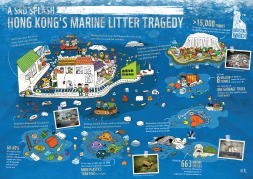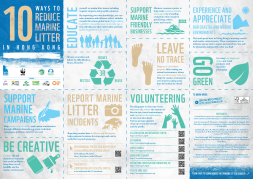Hong Kong is home to incredible coastal and marine biodiversity, with almost 6,000 marine species recorded in our waters; but our precious marine environment faces a constant assault from marine litter. in 2014, with the support of the Environment and Conservation Fund and the Environmental Campaign Committee, WWF-Hong Kong and six strategic partners launched a two-year large-scale ecological survey and coastal clean- up project called Coastal Watch. Working with over 2,000 volunteers from across society, the project has gathered and archived marine litter and ecological data at 34 sites around Hong Kong, aiming to identify point sources of marine litter and formulate solutions which in turn will help steer long-term marine conservation policy.
This report summarizes Coastal Watch’s survey results and its many achievements. First and foremost, the results draw attention to the fact that our unsustainable, disposable lifestyle is having long-lasting effects on the marine environment. The surveys reveal that plastic debris makes up between 60 and 80 per cent of marine litter found along our shorelines, on the sea surface and on the seabed; posing a serious threat to Hong Kong’s marine environment, including places that are seldom visited by people. The top ten types of plastic litter collected were disposable items like packaging, bottles, cutlery and polystyrene boxes, with the litter’s primary origins being domestic and recreational waste.
Clearly, Hong Kong’s current attempts to solve this problem are not working. More assertive and proactive approaches must be urgently adopted, including reducing waste generation, preventing waste from entering the sea and effectively cleaning up the marine environment. These actions will require close cooperation between the government, green groups and all of society across several key areas: policy and legislation, research, innovation, education, facility support, stakeholder engagement and enforcement.
As consumers ourselves, we should all work towards becoming part of the solution. Every one of us can start making things better today, by following the “3Rs” principles – REDUCE, REUSE and RECYCLE. This will reduce the generation of unnecessary waste and keep garbage out of the sea.
The Coastal Watch project has proved that the wider Hong Kong community wants to restore the marine environment, and we believe that by working together this is possible. by partnering with our neighbours – particularly Macau and Guangdong Province – we can lead the way and conduct research, innovate, improve our waste facilities and implement the policies necessary to tackle marine litter at source and help solve this pernicious global problem.


